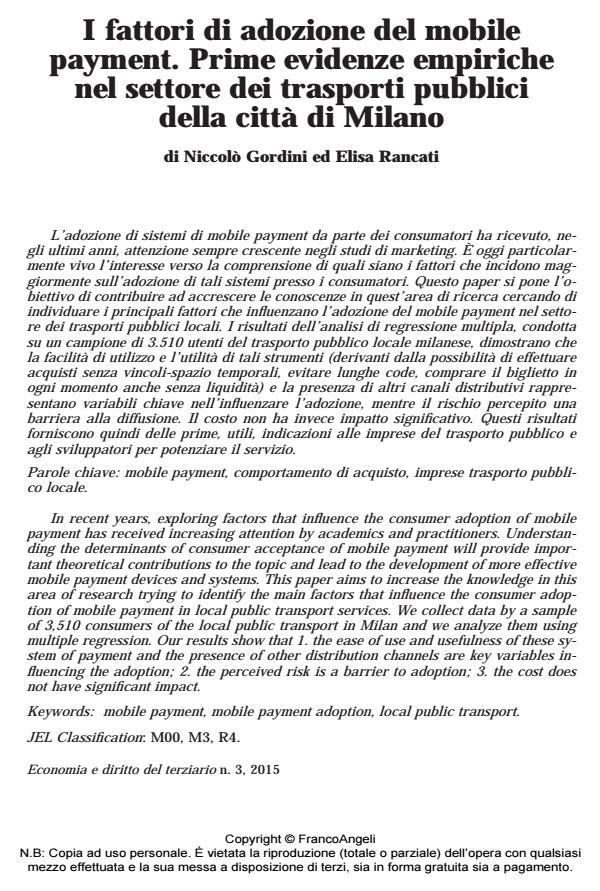I fattori di adozione del mobile payment. Prime evidenze empiriche nel settore dei trasporti pubblici della città di Milano
Titolo Rivista ECONOMIA E DIRITTO DEL TERZIARIO
Autori/Curatori Niccolò Gordini, Elisa Rancati
Anno di pubblicazione 2016 Fascicolo 2015/3
Lingua Italiano Numero pagine 0 P. 483-498 Dimensione file 440 KB
DOI 10.3280/ED2015-003006
Il DOI è il codice a barre della proprietà intellettuale: per saperne di più
clicca qui
Qui sotto puoi vedere in anteprima la prima pagina di questo articolo.
Se questo articolo ti interessa, lo puoi acquistare (e scaricare in formato pdf) seguendo le facili indicazioni per acquistare il download credit. Acquista Download Credits per scaricare questo Articolo in formato PDF

FrancoAngeli è membro della Publishers International Linking Association, Inc (PILA), associazione indipendente e non profit per facilitare (attraverso i servizi tecnologici implementati da CrossRef.org) l’accesso degli studiosi ai contenuti digitali nelle pubblicazioni professionali e scientifiche.
L’adozione di sistemi di mobile payment da parte dei consumatori ha ricevuto, negli ultimi anni, attenzione sempre crescente negli studi di marketing. È oggi particolarmente vivo l’interesse verso la comprensione di quali siano i fattori che incidono maggiormente sull’adozione di tali sistemi presso i consumatori. Questo paper si pone l’obiettivo di contribuire ad accrescere le conoscenze in quest’area di ricerca cercando di individuare i principali fattori che influenzano l’adozione del mobile payment nel settore dei trasporti pubblici locali. I risultati dell’analisi di regressione multipla, condotta su un campione di 3.510 utenti del trasporto pubblico locale milanese, dimostrano che la facilità di utilizzo e l’utilità di tali strumenti (derivanti dalla possibilità di effettuare acquisti senza vincoli-spazio temporali, evitare lunghe code, comprare il biglietto in ogni momento anche senza liquidità) e la presenza di altri canali distributivi rappresentano variabili chiave nell’influenzare l’adozione, mentre il rischio percepito una barriera alla diffusione. Il costo non ha invece impatto significativo. Questi risultati forniscono quindi delle prime, utili, indicazioni alle imprese del trasporto pubblico e agli sviluppatori per potenziare il servizio.
Parole chiave:Mobile payment, comportamento di acquisto, imprese trasporto pubblico locale
Jel codes:M00, M3, R4.
- An empirical analysis of “corporate Italy”: Legal entities, financial and ownership structure and corporate governance 2004-2012 Carlo Bellavite Pellegrini, in Corporate Ownership and Control /2013 pp.117
DOI: 10.22495/cocv10i4art9
Niccolò Gordini, Elisa Rancati, I fattori di adozione del mobile payment. Prime evidenze empiriche nel settore dei trasporti pubblici della città di Milano in "ECONOMIA E DIRITTO DEL TERZIARIO " 3/2015, pp 483-498, DOI: 10.3280/ED2015-003006